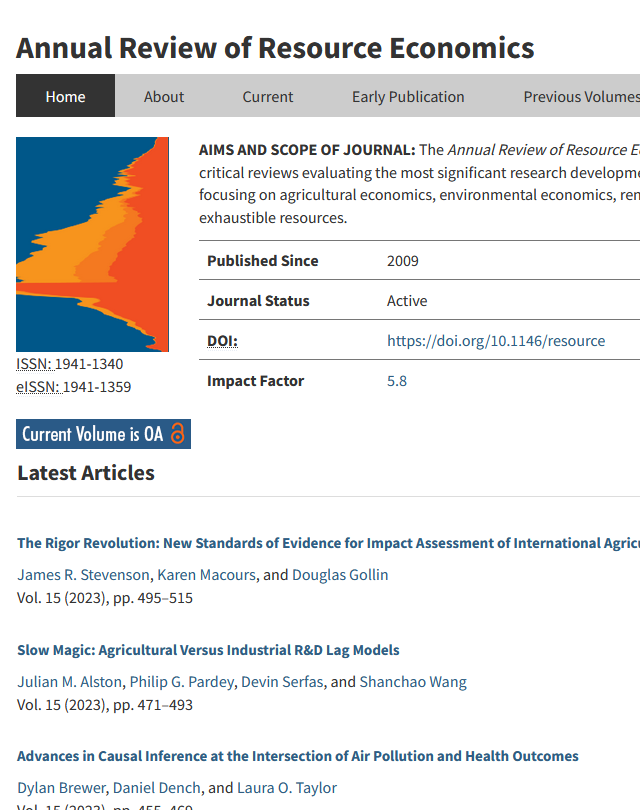混合实验经济学和生活实验室的水资源管理
IF 8.4
2区 经济学
Q1 AGRICULTURAL ECONOMICS & POLICY
Annual Review of Resource Economics
Pub Date : 2025-10-09
DOI:10.1146/annurev-resource-013024-033007
引用次数: 0
摘要
过度开发、干旱和污染给全球水资源供应带来的压力越来越大,因此需要有效和可持续的水资源管理。综合水资源管理战略在支持决策方面已显示出效力,但需要将经济和参与性方法更深入地结合起来。本研究回顾了实验经济学和生活实验室的核心特征和方向,旨在解决三个研究问题,即:如何将生活实验室的参与性、现实环境融入实验经济学的受控、假设驱动的本质;从实验经济学中获得的行为洞见在生活实验室的设计和实施中的意义是什么?以及如何将这两种方法合并到一个框架下。本综述的重点是通过协作和利益相关者驱动的创新来改善水资源管理。ll为共同创造提供了真实的环境,使科学家和利益相关者能够解决与水有关的问题,如供应、需求和短缺。这些环境将受控的实验条件与实际应用联系起来,为行为反应和政策制定提供全面的见解。通过经济方法,特别是通过考虑环境外部性和机会成本的综合框架对水资源进行评估,可以加强和加强法律效力。最后,本文表明,通过将干预措施置于现实世界环境中,将行为见解和实验方法整合到法律研究中,可以提高实验经济学的外部有效性。本文章由计算机程序翻译,如有差异,请以英文原文为准。
Blending Experimental Economics and Living Laboratories in Water Resource Management
The increasing pressure on global water supplies from overexploitation, drought, and pollution necessitates efficient and sustainable water management. Integrated water resource management strategies have shown effectiveness in decision support, but a deeper integration of economic and participative methodologies is needed. This research reviews the core characteristics and directions of experimental economics and living labs (LLs) and aims to address three research questions, namely, how the participatory, real-world environment of living laboratories can be incorporated into the controlled, hypothesis-driven nature of experimental economics; what is the significance of behavioral insights that are derived from experimental economics in the design and implementation of living labs; and how these two approaches can be merged under one framework. The focus of this review is the improvement of water resource management through collaborative and stakeholder-driven innovation. LLs provide authentic environments for cocreation, allowing scientists and stakeholders to address water-related issues such as supply, demand, and shortage. These environments connect controlled experimental conditions with real applications, providing comprehensive insights into behavioral reactions and policy formulation. LLs can enhance and be strengthened by economic methodologies, particularly in water valuation through integrated frameworks accounting for environmental externalities and opportunity costs. Finally, this article shows that integrating behavioral insights and experimental approaches within LLs improves the external validity of experimental economics by putting interventions in real-world settings.
求助全文
通过发布文献求助,成功后即可免费获取论文全文。
去求助
来源期刊

Annual Review of Resource Economics
AGRICULTURAL ECONOMICS & POLICY-
CiteScore
9.40
自引率
0.00%
发文量
34
期刊介绍:
The Annual Review of Resource Economics provides authoritative critical reviews evaluating the most significant research developments in resource economics, focusing on agricultural economics, environmental economics, renewable resources, and exhaustible resources.
 求助内容:
求助内容: 应助结果提醒方式:
应助结果提醒方式:


